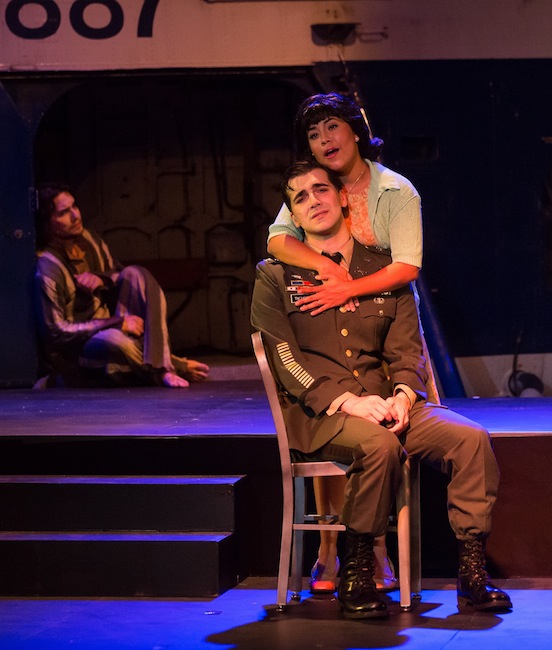HGO’s “Glory Denied” proves a visceral triumph in (another) unconventional space

Mark Thomas (background), Ben Edquist, and Alexandra Smither in Tom Cipullo’s “Glory Denied” at Houston Grand Opera. Photo: Lynn Lane
Even before Hurricane Harvey forced Houston Grand Opera into the decidedly unconventional Brown Convention Center, the creative team at HGOco–the company’s community engagement arm–was in the hunt for a non-traditional venue for Tom Cipullo’s Glory Denied.
The capstone event of HGOco’s multi-year “Veterans Songbook” project, the Houston premiere of Cipullo’s powerful chamber opera was well timed for this Veteran’s Day week.
On Monday evening, the HGO presented Glory Denied inside the 1940 Air Terminal Museum Hangar on the grounds of Houston’s Hobby Airport. In the center of the otherwise bare, concrete space, a twin-engine Cessna Bobcat and a Sikorsky S-58 helicopter flanked the raised stage, giving the scene a stunning immediacy. One could sense right away this was not going to be a typical “night at the opera,” and that was the point.
Glory Denied is a challenging piece to experience. Based on journalist Tom Philpott’s oral history of the harrowing tribulations of Col. Jim Thompson, America’s longest-held POW in Vietnam, Cipullo’s nonlinear, fragmented libretto effectively mirrors the tenuous bond connecting the four characters, focusing on the older and younger versions of Thompson and his wife Alyce. Throughout the action, they are on stage together and apart, in assorted groupings reaching across time. Each is isolated in a prison real or imaginary, each bewildered by events beyond their control, each occupying a divergent emotional space, and each trying to survive the shattering trauma of loss.
Cipullo’s music is at once complex and accessible, but always serves to illuminate the story. Biting dissonance and jagged rhythms reflect the horrors of torture, complete with percussive whips. Declamatory writing juxtaposes against soaring, lyrical arias. The compact structure, with seamless transitions between ensemble pieces and solo arias, kept the dramatic tension high throughout.
The superb cast wrung every ounce out of the raw, gut-wrenching emotions contained in the score. Ben Edquist, in the role of Older Thompson, was exceptional in embodying the different aspects of his character with a rich, robust baritone and impressive acting. The range of expression he achieved was astounding—a voice of glinted steel as the tormentor in Act I, an increasingly desperate voice full of confusion, bitterness, and anguish, rambling out a list of things he no longer understands about his country in the “Welcome Home” solo—moving from a self-assured, controlled voice in his address to the congregation, to his aching solo as a drunken, broken man.
Kerriann Otano’s deep, powerful soprano gave Older Alyce a commanding presence. Her warm, beautiful rendering of the aria “After You Hear Me Out” stood out as some of the most lyrical and poignantly expressive singing of the night.
Mark Thomas, in the relatively smaller role of Younger Thompson, drew our sympathy with his realistic portrayal of the suffering prisoner. He excelled in the difficult ensemble passages, finding a good balance that still allowed his clear tenor voice to shine. Soprano Alexandra Smither (Younger Alyce) imbued her solo aria “My Darling Tom” with heartbreaking tenderness. It was the only ray of light in this relentless, intense 90-minute opera, providing a much-needed moment of innocence.
Carleen Graham offered deft and inventive stage direction. The minimal set was used to maximum impact, with a kitchen table turned upside down becoming the cruel cage Young Thompson was forced to live in for 4 months. The singers’ choreographed positions and entrances and exits lent precision and forcefulness to each scene. This was compelling theater in every detail.
The nine-piece chamber orchestra, led adroitly by HGO Studio alumnus Geoffrey Loff in his conducting debut, provided the steady underpinning and rhythmic intensity that made all the vocal fireworks possible. More nuanced orchestral colors were sometimes lost in the cavernous space, and the singers had to be slightly amplified to compensate for the acoustic.
But seeing the aircrafts looming over the stage, and the startling jolt from hearing the sound of real planes booming through the night air on takeoff and landing, gave this already compelling production an added visceral punch, more than making up for the acoustical challenges.
It was, in the end, a great night at the opera.
Glory Denied will be repeated 7:30 p.m.Thursday. houstongrandopera.org
Sherry Cheng is a Houston-based freelance pianist, chamber musician, arts writer, and music educator. She writes about music for Arts and Culture TX magazine, runs the Houston Community College Chamber Music Series, teaches preschool music, and performs regularly with professional musicians in Texas.
Posted Nov 08, 2017 at 9:32 am by Tom Philpott
Sherry, that was a beautifully written, tight and very informative review.